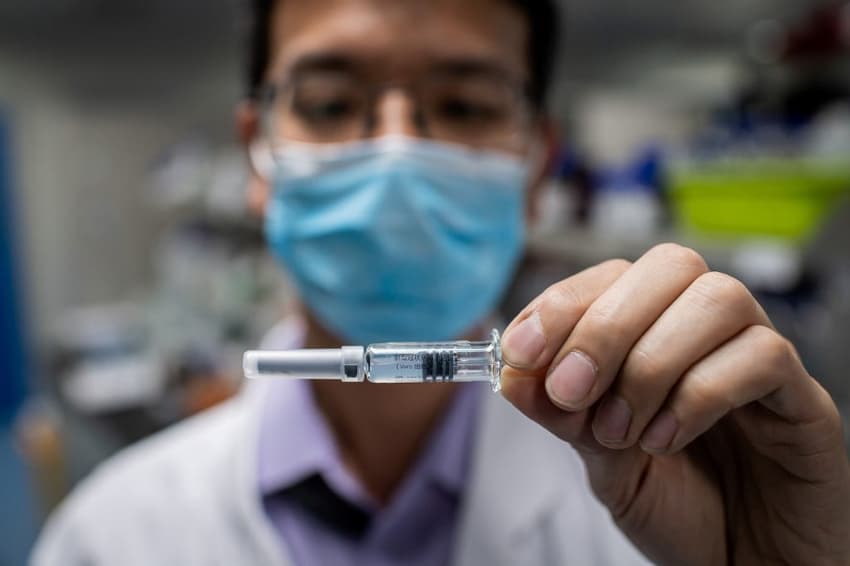Almost half of all people in Italy 'hesitant' about Covid vaccine, study finds

Nearly one in two people in Italy are uncertain about whether they would take a coronavirus vaccine if recommended it by the country's health authorities.
Italy's health minister has warned that it's vital to follow the country's Covid-19 health precautions until a vaccine becomes available.
But It's still unclear when that could be.
Foreign Minister Luigi Di Maio claimed in a recent interview that a vaccine could be ready to roll out in Italy by early 2021. However, medical experts have repeatedly stressed that there are no guarantees.
Along with Germany, France and the Netherlands, Italy has signed an agreement with pharmaceutical group AstraZeneca to guarantee the supply of 300 million doses of an experimental vaccine that the company is developing with Oxford University in the UK.
Though the vaccine is still being tested, here's what we know about it so far.
Even if a vaccine became available, however, around half of the country would be sceptical about taking it according to a new Italian study.
Almost one in two people in Italy are either sceptical or uncertain about whether they would take a coronavirus vaccine if recommended it by the country's health authorities, according to research conducted by the EngageMinds Hub, a research centre at Italy's Catholic University (Università cattolica).
The study, with 1,000 participants, found that one in 10 Italians (11 percent) are "completely against" the vaccine, a further nine percent think it is unlikely they would take it, and 28 percent are doubtful.
“More than 48 percent of the respondents were hesitant about the future prospect of taking a vaccine against the ongoing epidemic," the study's authors wrote.
"This is a very high figure, but above all, an increase compared to May," they noted.
When the researchers previously asked the same question in May, the results showed that about 40.5 percent were against or undecided.
This is important, researchers noted, as "the effectiveness of the vaccine will depend not only on the abilities of the scientists who are developing it, but also on the percentage of people who undergo vaccination."
Trust in the vaccine is decreasing most among under 35s, the study found.
The percentage in that age group who said they were uncertain went from 34 percent in May to 49 percent at the end of September; an increase of 15 percent. Other age groups remained more stable.
"The growing hesitation towards the future vaccine may have various causes, but it is probably linked to fears about its safety," said Professor Guendalina Graffigna, director of EngageMinds Hub.
This may be "due to the rapid speed of development and testing," she said.
"In fact, about one in two Italians fear that a vaccine against Covid-19 may not be adequately tested, and only 22 percent would participate as a volunteer in trials."
There is a similar level of "hesitation" about already-developed vaccines such as those against measles or flu, the study found
Fewer than one in four participants in the same study said they were likely they are to take the flu vaccine.
Authorities are urging people to get a flu shot, and have made them available earlier than usual this year, as concerns mount about the combined impact of flu season and coronavirus.
The findings of a separate, international study appeared to show more trust in vaccines in Italy.
Around 55 percent of the Italian population said they were "completely certain" they would take a Covid-19 vaccine, according to the European study by Denmark's Aarhus University.
This compared to 38 percent in France, 65 percent in the UK, and over 80 percent in Denmark.
Italy has had long had a large anti-vaccine movement. A relatively low number of vaccinations in the country is thought to be one of the factors behind an increase in measles cases in recent years.
Comments
See Also
But It's still unclear when that could be.
Foreign Minister Luigi Di Maio claimed in a recent interview that a vaccine could be ready to roll out in Italy by early 2021. However, medical experts have repeatedly stressed that there are no guarantees.
Though the vaccine is still being tested, here's what we know about it so far.
Even if a vaccine became available, however, around half of the country would be sceptical about taking it according to a new Italian study.
Almost one in two people in Italy are either sceptical or uncertain about whether they would take a coronavirus vaccine if recommended it by the country's health authorities, according to research conducted by the EngageMinds Hub, a research centre at Italy's Catholic University (Università cattolica).
The study, with 1,000 participants, found that one in 10 Italians (11 percent) are "completely against" the vaccine, a further nine percent think it is unlikely they would take it, and 28 percent are doubtful.
Around 55 percent of the Italian population said they were "completely certain" they would take a Covid-19 vaccine, according to the European study by Denmark's Aarhus University.
This compared to 38 percent in France, 65 percent in the UK, and over 80 percent in Denmark.
Italy has had long had a large anti-vaccine movement. A relatively low number of vaccinations in the country is thought to be one of the factors behind an increase in measles cases in recent years.
Join the conversation in our comments section below. Share your own views and experience and if you have a question or suggestion for our journalists then email us at [email protected].
Please keep comments civil, constructive and on topic – and make sure to read our terms of use before getting involved.
Please log in here to leave a comment.